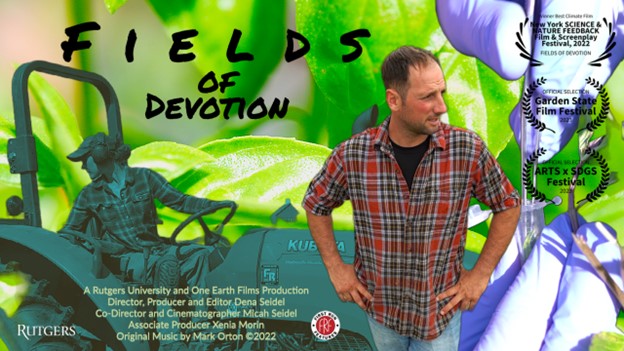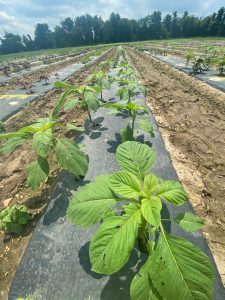
Please click here to RSVP today.
- Fields of Devotion film screening
- A discussion with the film’s featured farmers and scientists
- Networking reception for farmers, scientists, and students
Rutgers Cooperative Extension

Please click here to RSVP today.
Dear vegetable producer,
Joe Ingerson-Mahar and I are collaborating with researchers at Purdue University and The College of Wooster and are asking you to participate in a study titled “Insect Pest Management in Vegetable Crops Survey” (Purdue IRB protocol no. 2021-979). The purpose of this study is to gather information on insect pest management practices and strategies used by vegetable producers in the Great Lakes and Mid-Atlantic regions. The information provided will help direct pest management research and extension programs in specialty crop production.
You must be at least 18 years of age to participate. The survey will take approximately 20-25 minutes to complete. The survey is anonymous and the researchers have pledged to keep your data confidential. Only aggregated results will be reported in any publications or presentations about the study.
In appreciation of your participation in the survey, you can choose to enter a raffle for a hardcopy of one of two complimentary production guides: the Midwest Vegetable Production Guide for Commercial Growers ($21 value), or the Mid-Atlantic Commercial Vegetable Production Guide ($25 value). Instructions for entering the raffle will be given at the end of the survey.
To begin the online survey, click this link.
Participation in this study is voluntary and you may withdraw from participation at any time. If you have any questions, you may contact the researchers:
Dr. Carlo Moreno (First point of contact)
The College of Wooster
931 College Mall, Wooster, OH, 44691
Phone: 330-287-1982
Email: cmoreno@wooster.edu
Dr. Elizabeth Long
Purdue University
901 W. State Street, Lafayette, IN 47907
Phone: 765-496-1918
Email: long132@purdue.edu
 New Jersey vegetable growers are invited to join Dr. Jim Simon, New Use Crop Specialist, and PhD Student Tori Rosen for a twilight visit to their Amaranth “Tropical Spinach” field trials. Participants will help select amaranth varieties of interest for use as leafy greens at the Rutgers Horticultural Farm III, 67 Ryders Land, East Brunswick, NJ on Thursday, July 22, 2021 and Friday, July 23, 2021, 5:30-7:30pm both days. Please RSVP for Thurs or Fri through this link:
New Jersey vegetable growers are invited to join Dr. Jim Simon, New Use Crop Specialist, and PhD Student Tori Rosen for a twilight visit to their Amaranth “Tropical Spinach” field trials. Participants will help select amaranth varieties of interest for use as leafy greens at the Rutgers Horticultural Farm III, 67 Ryders Land, East Brunswick, NJ on Thursday, July 22, 2021 and Friday, July 23, 2021, 5:30-7:30pm both days. Please RSVP for Thurs or Fri through this link:
https://forms.gle/RUU3wgzuGgvAnJCH8
Ruth Dahlquist-Willard, Ph.D., Small Farms and Specialty Crops Farm Advisor with the University of California Cooperative Extension in Fresno and Tularie Counties is conducting a national survey of growers and consumers of specialty Asian produce.
The purpose is to identify which types of specialty Asian produce are almost always cooked before eating, so that Southeast Asian and other small-scale farmers can receive exemptions from federal food safety regulations for low-risk crops. She would appreciate your help by both taking the survey and also sharing it widely with consumers of these crops, so she can gather data to provide to the FDA on whether they are eaten cooked or raw.
Click here to take the survey and enter to win a $50 gift card
Food safety regulations have exemptions for produce that is usually cooked instead of eaten raw, because the risk to consumers from human pathogens is much lower. Crops like potatoes, pumpkins, or lima beans that are almost always cooked before eating have a much lower risk than leafy greens such as lettuce and spinach that are frequently eaten raw.
The FDA’s current list of “rarely consumed raw” produce does not include many types of produce that are culturally important to diverse communities of consumers across the US, because the FDA does not have data on how they are eaten. Because these crops are not on the list, small-scale farmers growing specialty produce cannot receive the exemptions that mainstream crops do, even if their crops are never eaten raw.
We now have an opportunity to submit data to the FDA on additional crops that usually are cooked, pickled, or fermented to kill any disease organisms before eating. Data will be shared with the FDA to recommend additional culturally important crops to be added to the “rarely consumed raw” list, so that these crops can receive the same exemptions as mainstream “rarely consumed raw” crops under the federal Food Safety Modernization Act (FSMA).
Please help us contribute to making federal food safety regulations more inclusive of diverse communities of farmers and consumers. Click here or on the link above to take the 15-minute survey, and please share widely with any individuals or organizations who might be interested.
As a thank you for completing the survey, respondents can enter a drawing to receive one of ten $50 gift cards.
Thank you for helping to support. This effort will help diversified farmers here in NJ as well!
If you have questions about the survey, you may contact Dr. Dahlquist-Willard at:
Ruth Dahlquist-Willard, Ph.D.
Small Farms and Specialty Crops Farm Advisor
University of California Cooperative Extension, Fresno and Tulare Counties
Voicemail: 559-241-7513 (working remotely)
Dr. Albert Ayeni of Rutgers Department of Plant Biology summarized ongoing work of our Ethnic Crop Research Group exploring new crops for the diverse ethnic populations of the Garden State and beyond in an article published on HortDaily.com during the summer.
According to Ayeni, “Ethnic (or Exotic) crops present new opportunities for growers, produce marketers and consumers in New Jersey (NJ) and the Mid-Atlantic.”
As the season comes to an end and you have some more time to read, learn about four crops that Ayeni finds especially interesting at “Ethnic Crops Present New Opportunities for Growers in NJ and Mid-Atlantic”.
Cooperating Agencies: Rutgers, The State University of New Jersey, U.S. Department of Agriculture, and Boards of County Commissioners. Rutgers Cooperative Extension, a unit of the Rutgers New Jersey Agricultural Experiment Station, is an equal opportunity program provider and employer.
Rutgers University is an equal access/equal opportunity institution. Individuals with disabilities are encouraged to direct suggestions, comments, or complaints concerning any accessibility issues with Rutgers web sites to: accessibility@rutgers.edu or complete the Report Accessibility Barrier or Provide Feedback Form.
Copyright © Rutgers, The State University of New Jersey, an equal opportunity, affirmative action institution
Copyright © 2026 · Generate Child Theme on Genesis Framework · WordPress · Log in